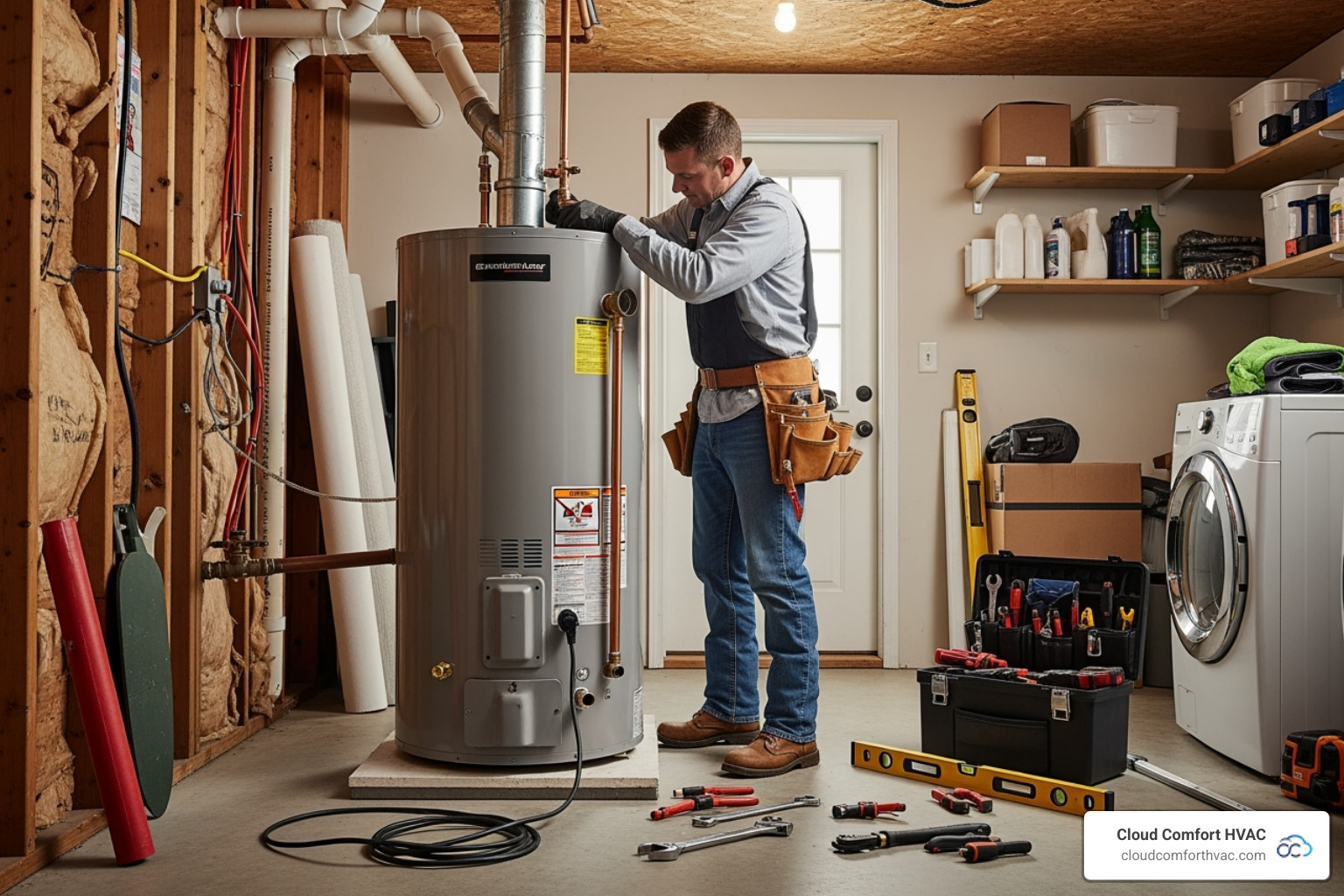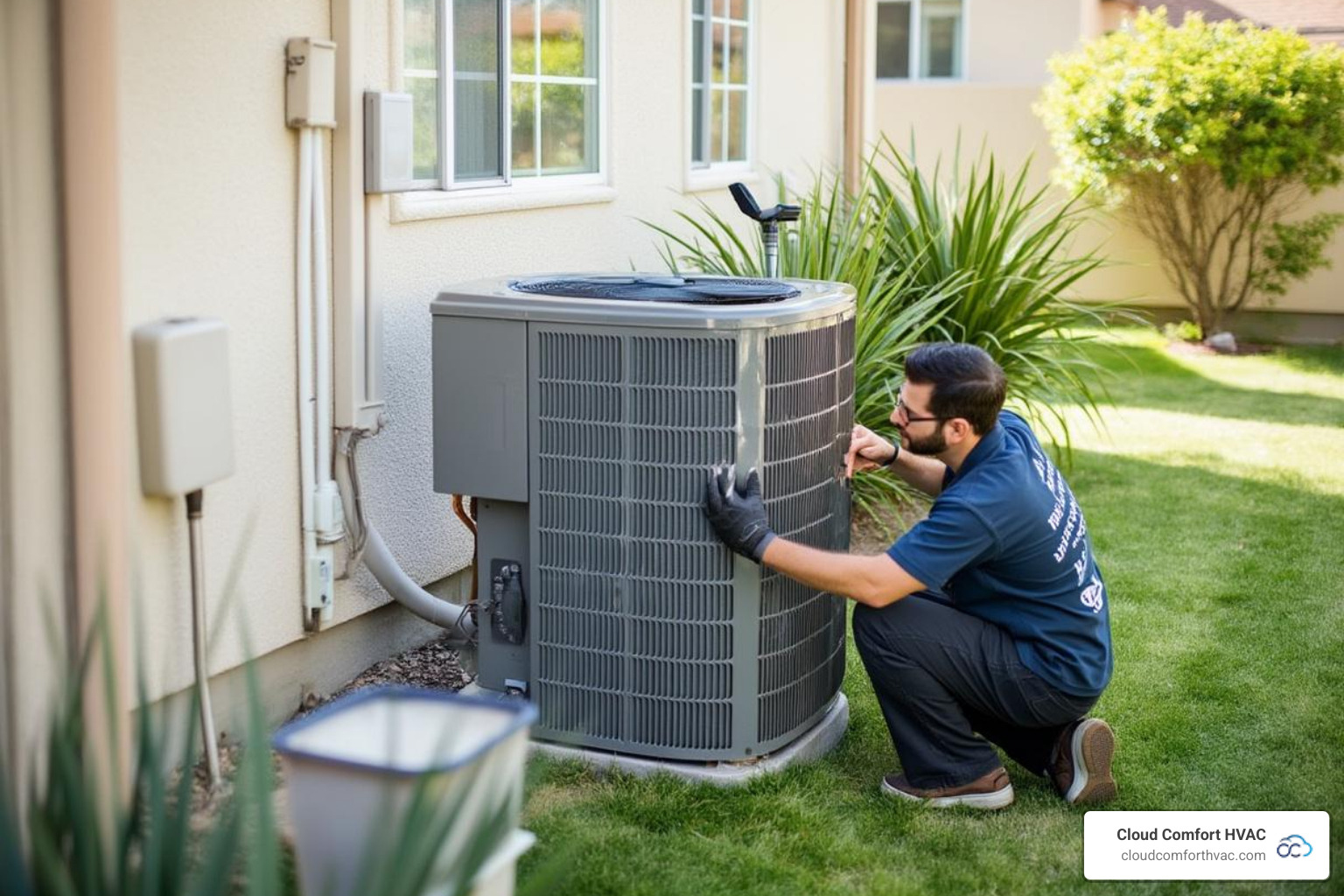Water Heater Woes: A Guide to Fixing Leaks and Drips
When Your Hot Water Heater Leaks: What to Know First
Finding your hot water heater leaking can be a sudden and alarming event. A puddle around your water heater can cause a lot of panic. But don't worry, you can take immediate steps to handle the situation.
What to do immediately if your hot water heater is leaking:
- Stay Calm: A leak can seem scary, but quick action can prevent major damage.
- Verify the Leak: Make sure the water is actually from the water heater and not condensation or another source nearby. Wipe the area dry and watch closely.
- Shut Off Power/Gas: For safety, turn off the electricity at the breaker or the gas supply to the unit.
- Shut Off Water Supply: Find the cold water shut-off valve on top of the heater and turn it off. If you can't reach it, turn off your home's main water supply.
- Locate the Leak Source: Once safe, try to pinpoint where the water is coming from (top, side, or bottom of the tank).
- Call a Professional: For most leaks, especially if they are from the tank itself, you'll need expert help.
A leaking hot water heater isn't just an annoyance; it can lead to serious water damage, mold growth, and higher utility bills. Acting fast is key to protecting your home. This guide will walk you through what to do, how to find the leak, and how to prevent future problems.
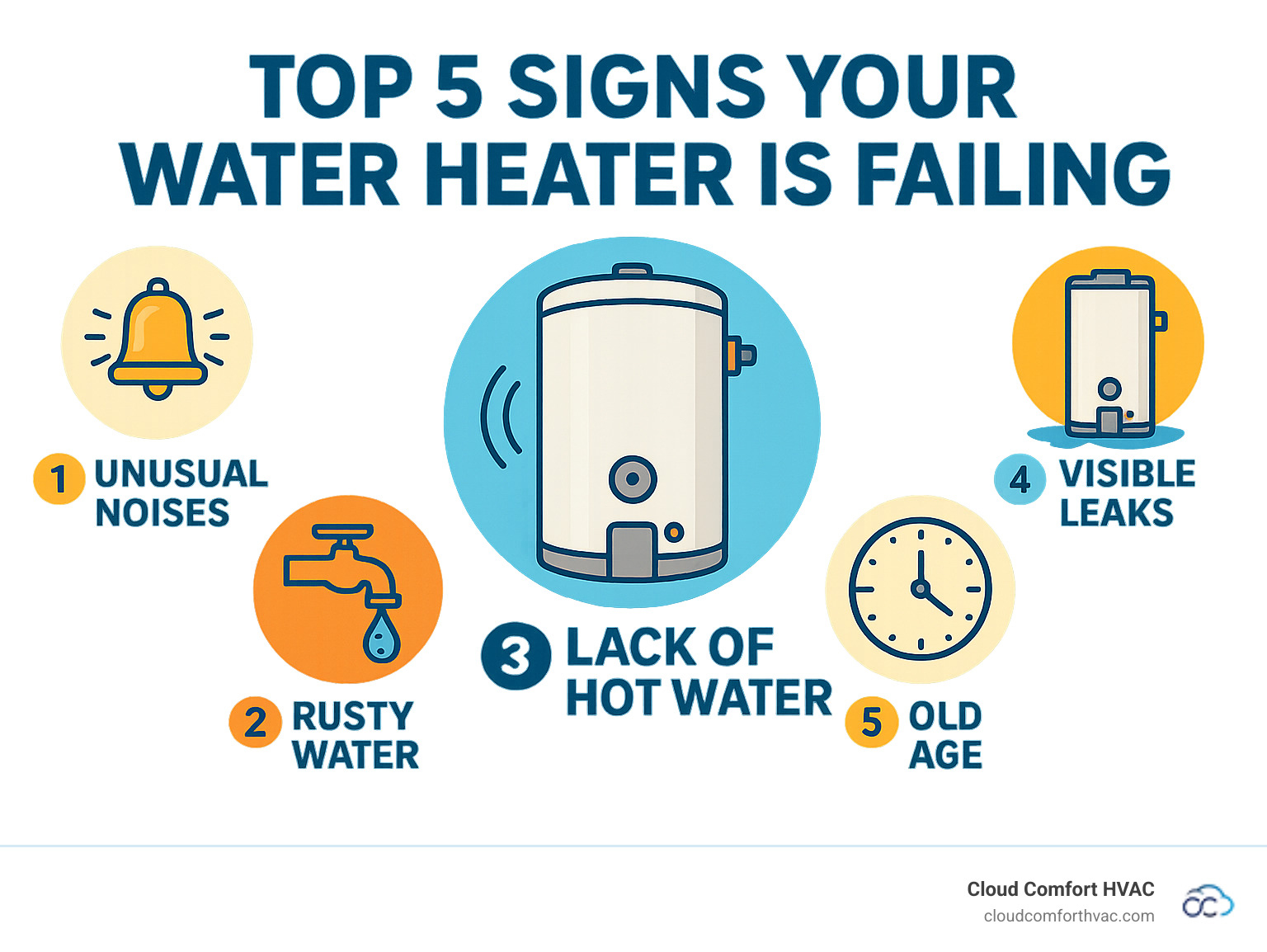
First Response: What to Do Immediately When You Find a Leak
Finding a puddle around your water heater is an "all hands on deck" moment. Don't panic; your first response is about keeping everyone safe and stopping the leak from causing more trouble. Taking quick action when your hot water heater is leaking can save you headaches and repair bills. Let's walk through the steps to handle this like a pro.
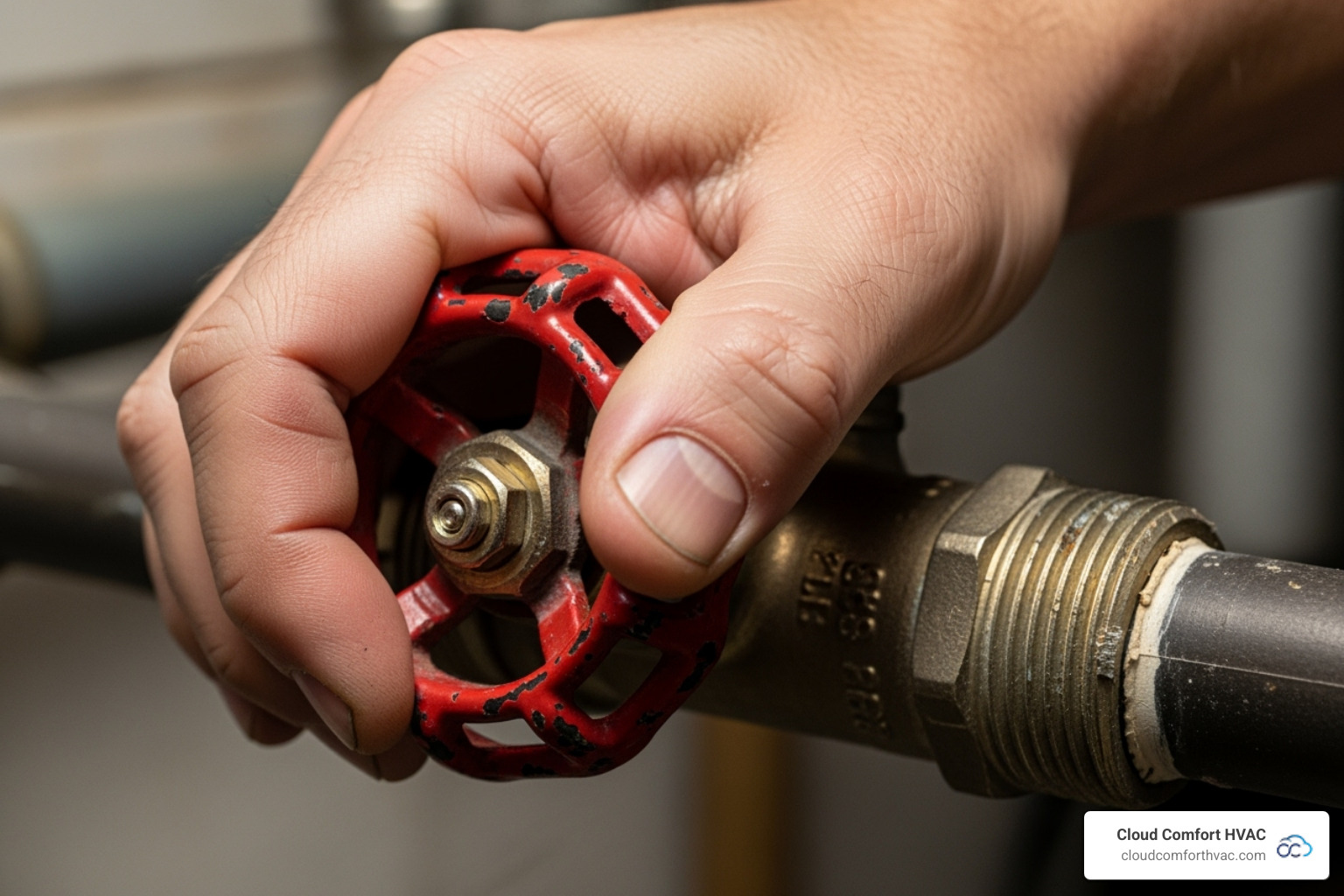
First, stay calm. Panicking won't help, but quick action will. The main goal is to cut off the power or gas, then shut off the water. These two steps are crucial for your safety and to prevent the water from spreading.
Step 1: Turn Off the Power or Gas Supply
This is your first priority. For an electric water heater, go to your home's main electrical panel (breaker box). Find the breaker for your water heater and flip it to the "OFF" position. This cuts electricity to the unit, preventing electrical hazards.
For a gas water heater, find the on/off switch or dial near the gas line connection on the tank. Turn the dial or switch to "OFF." This stops gas flow to the burner, preventing fire or gas leak risks. If you're ever unsure, please call a professional; your safety is paramount.
Here's a quick comparison:
| Water Heater Type | How to Turn Off Power/Gas |
|---|---|
| Electric | Locate the dedicated circuit breaker in your electrical panel and flip it to the "OFF" position. |
| Gas | Turn the gas supply dial or switch on the unit to the "OFF" position. |
Step 2: Shut Off the Water Supply
With the power or gas safely off, cut the water supply to the heater itself. This is key to stopping the tank from refilling and adding to the puddle.
Find the cold water shut-off valve, usually a lever or knob on the cold water supply line right above your water heater. Turn it clockwise until it's fully closed to stop new water from flowing into the tank.
If that valve is stuck, hard to reach, or unsafe to access, your backup plan is to turn off your home's main water supply. This valve is typically located where the main water line enters your house, such as the basement, a utility closet, or outside by your water meter. Knowing its location before an emergency is a game-changer. This helpful guide on Finding your home's main shut-off valve can help. Turning off the main supply will stop all water flow, preventing more flooding from that hot water heater leaking.
Step 3: Drain the Tank (If Necessary)
This step isn't always a must-do, but it's a smart move for a noticeable leak or while you're waiting for a pro. Draining the tank relieves pressure and empties out the water, which means less potential water damage.
To get started, attach a garden hose to the drain valve (the spigot near the bottom of your water heater). Direct the other end of the hose somewhere safe for hot water to go, like a floor drain or a sturdy bucket. Once the hose is secure, open the drain valve. For faster draining, open a hot water faucet somewhere else in your house to let air into the system. The water will be hot, so be careful. Have some old towels handy to catch any drips. Draining the tank is a fantastic way to protect your home from more damage. If you need a helping hand, our Water Heater Services team is always ready to assist!
Pinpointing the Problem: Your Guide to a Hot Water Heater Leaking
Once you've secured the situation by turning off the power and water, it's time for some detective work. Pinpointing the leak's source is the next crucial step to understand the problem's severity. Sometimes, what looks like a hot water heater leaking is actually just condensation.

To tell the difference, wipe the area around your water heater completely dry, then place paper towels around the base. Check on it after a few hours. If moisture reappears evenly across the tank's surface, it's likely condensation, which is common in cold locations like a basement. However, if water is actively dripping from a specific point, you have a genuine leak. Let's explore the most common leak sources.
Leaks from the Top of the Water Heater
Leaks from the top of your water heater are often less severe than those from the bottom, but they still demand prompt attention. They usually come from the connections where water lines meet the tank.
First, check the cold water inlet pipe and the hot water outlet pipe. These connections can loosen over time from vibrations or temperature changes. Often, a gentle tightening with a pipe wrench can fix minor drips, but be careful not to overtighten. Worn gaskets inside these connections can also be the culprits and will need to be replaced.
Another spot to check is the anode rod port. The anode rod is crucial for protecting your tank from rust and is screwed into the top. If this connection is loose or the rod is corroded where it enters the tank, it could leak. Any leak from the top of your unit is a sign that professional attention is needed. Our team offers expert Water Heater Repair in Rancho Palos Verdes, CA to get these issues sorted out swiftly.
Leaks from the Side: A Common Hot Water Heater Leaking Issue
When water comes from the side of your water heater, the primary suspect is usually the temperature and pressure (T&P) relief valve. This is a critical safety device, and a leak is its way of telling you something important.
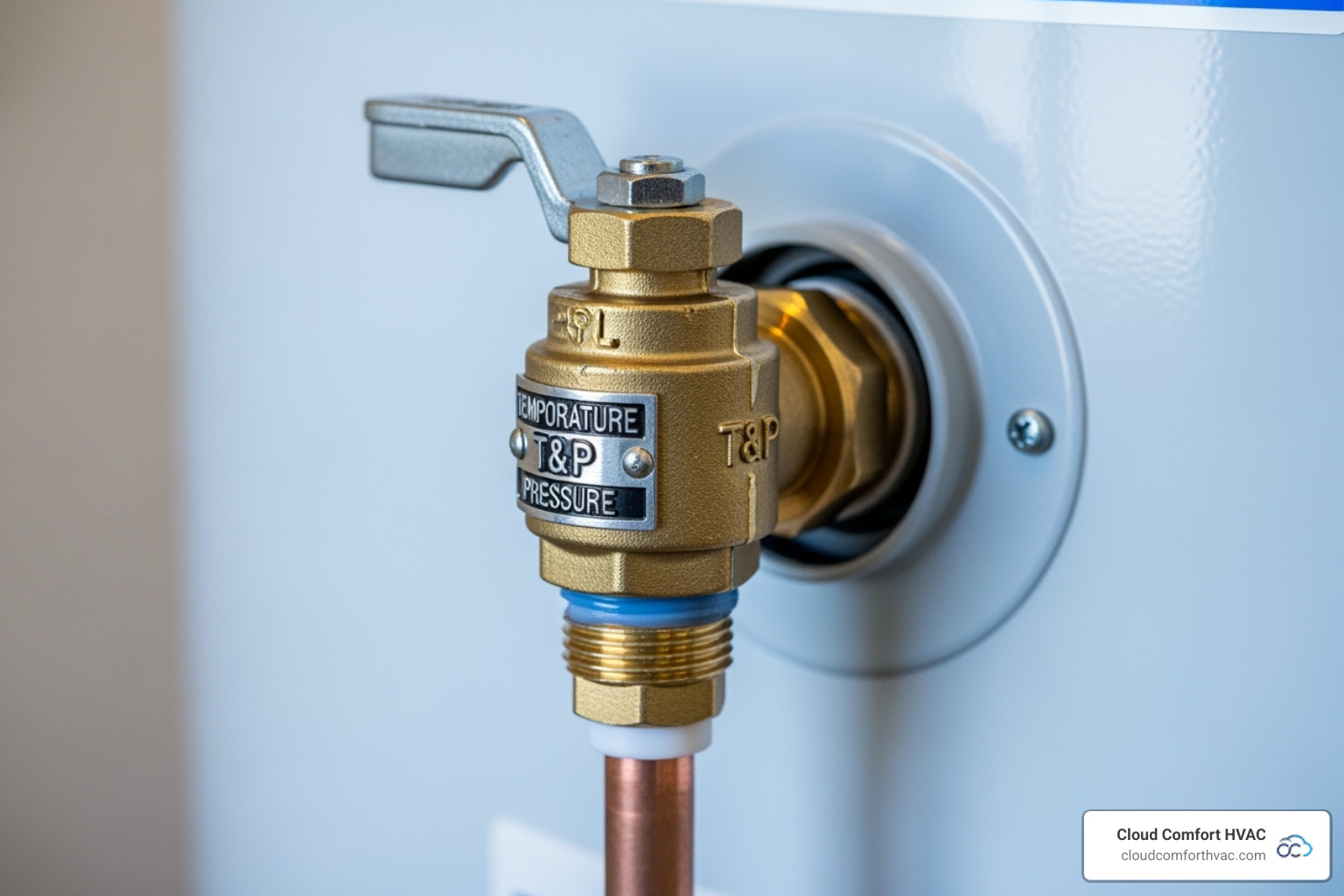
The T&P valve's main job is to release water if the temperature or pressure inside the tank gets too high, preventing a potential explosion. According to the Department of Energy, the T&P valve is a critical safety feature.
If your T&P valve is discharging, it could mean the water pressure in your home is too high or the thermostat is set too high, causing the water to overheat. The valve typically activates if the temperature exceeds 120°F (49°C), the recommended maximum for most tank heaters.
Sometimes, the valve itself can become faulty or corroded and leak even when temperature and pressure are normal. A minor leak from the threads might be fixed by re-sealing them with Teflon tape, but if the valve is actively dripping, it needs to be replaced. Any leak from the T&P valve is a serious matter that warrants immediate professional assessment. We're experts in all types of water heaters, including Gas Water Heaters in Torrance, CA, and can diagnose and resolve T&P valve issues safely.
Leaks from the Bottom: The Most Serious Hot Water Heater Leaking Problem
A leak at the bottom of your water heater is often the most concerning type, as it can signal a serious internal problem. Before assuming the worst, rule out simpler causes.
Start by checking the drain valve at the bottom of the tank. If this valve is loose, corroded, or has a faulty seal, it can cause a leak. Sometimes, tightening the valve or flushing it to clear debris can stop a minor drip. While a temporary cap can be used as a stopgap, we recommend contacting a professional for a permanent solution.
If the leak is coming directly from the tank's base, it almost always means the internal tank has corroded or cracked. This is the most serious kind of hot water heater leaking issue. Sediment buildup at the bottom of the tank can cause the steel to rust and crack over time, especially in older units. Unfortunately, a cracked tank cannot be repaired and requires a full water heater replacement. If you suspect an internal tank leak, it's time for a replacement. Our team specializes in Water Heater Replacement in Culver City, CA, providing energy-efficient solutions.
To Fix or Not to Fix: DIY Repairs vs. Professional Service
Now that you've found where your hot water heater leaking problem is coming from, you're likely wondering: "Can I fix this myself, or do I need to call someone?" The answer depends on the problem, your water heater's age, and your comfort with basic plumbing.
Water heater leaks never get better on their own. A tiny drip can turn into a flood, cause mold, or increase your water bill. The good news is that some minor issues are manageable for a handy homeowner. However, others require professional expertise to avoid making things worse or creating a safety hazard.
Common DIY Fixes for Minor Leaks
If you're dealing with a small leak and feel confident, you might be able to tackle it yourself. Remember to always turn off the power/gas and the water supply before attempting any repairs.
- Tightening loose connections is a common fix. The pipes at the top of your water heater can loosen over time. Use a pipe wrench to gently tighten them, but be careful not to overtighten, which can crack the fitting.
- Using Teflon tape on the threads before you tighten creates a better seal and helps prevent future leaks.
- Addressing drain valve issues can sometimes be done temporarily. If the nozzle is dripping, you might be able to replace a worn washer. A temporary cap can also stop the drip, but this is just a stopgap. We always recommend a professional for a permanent solution.
Even these "simple" fixes require care. Water heaters involve electricity or gas and pressurized water. If you're not confident, there's no shame in calling for help.
When to Call a Professional Plumber
Some situations absolutely require professional expertise. Don't risk your safety or your home with these issues:
- A cracked tank is not a DIY repair. If water is leaking from the tank itself, especially the bottom, it has reached the end of its life and needs to be replaced.
- T&P valve problems are serious. If the valve is actively discharging, it's signaling a potentially dangerous situation like high pressure or temperature. A professional diagnosis is needed.
- Gas leaks are an emergency. If you smell gas, don't try to fix anything. Turn off the gas supply if it's safe to do so, evacuate your home, and call your gas company immediately.
- Major water damage or simply feeling overwhelmed are also valid reasons to call the pros. They have the right tools and experience to handle any situation safely.
Age is also a factor. If your water heater is over 10 years old and has significant leaks, replacement often makes more financial sense than repairs. According to Energy Star, It's time to replace the water heater when it's old and inefficient.
Our team provides expert Water Heater Repair in Manhattan Beach, CA and can help you decide whether repair or replacement is your best option.
Prevention is Key: How Regular Maintenance Stops Leaks Before They Start
An ounce of prevention is truly key for your water heater. Many homeowners deal with the stress and expense of a hot water heater leaking situation that could have been avoided with simple, regular maintenance.
Most water heaters have a lifespan of 8-12 years. Proper maintenance can help yours reach the upper end of that range, while neglect, especially with hard water, can shorten its life. Hard water minerals build up as sediment, which can cause serious problems. Think of annual maintenance as a small investment that extends your water heater's life, keeps it efficient, and gives you peace of mind.
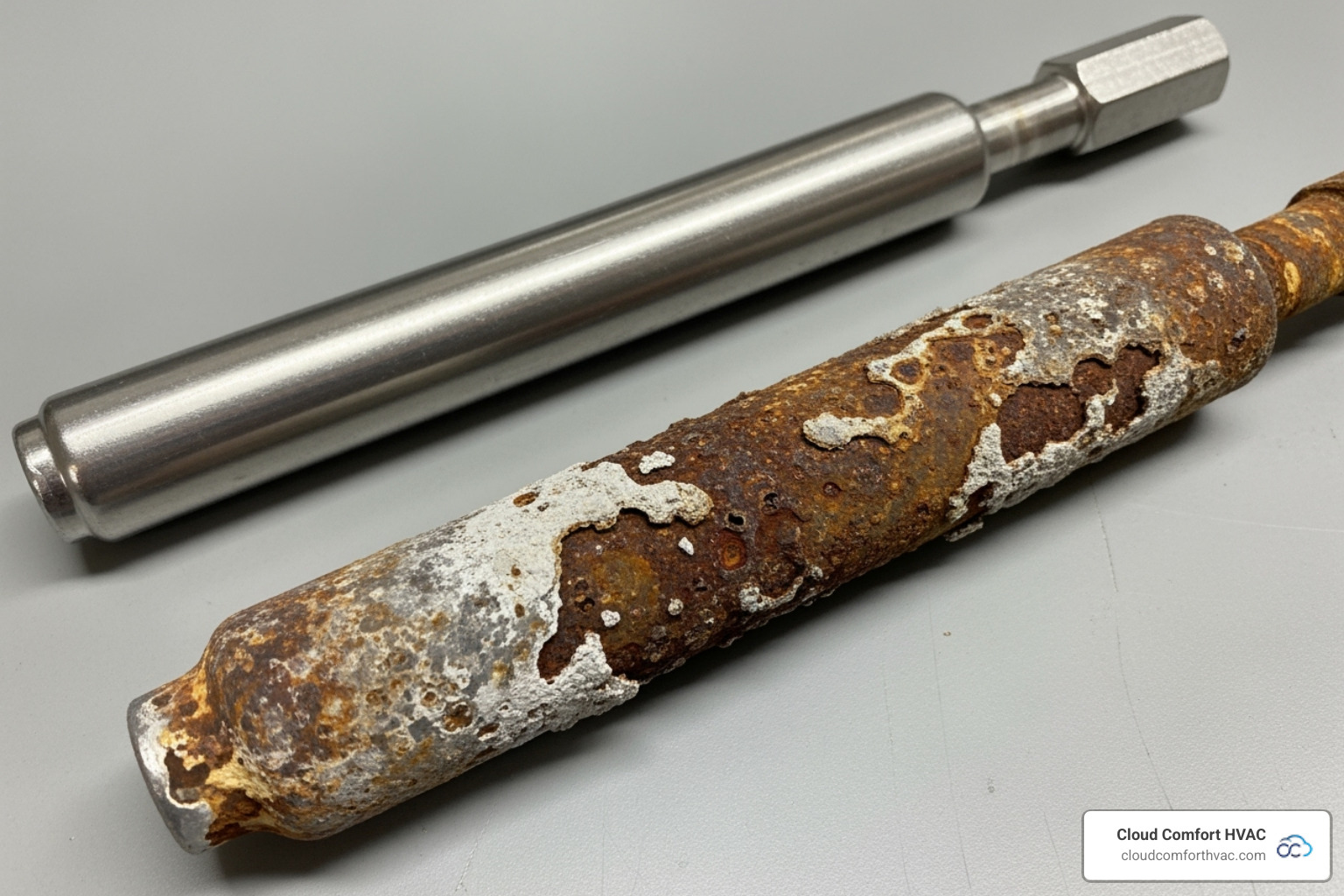
Annual Maintenance Checklist
A yearly maintenance routine can catch small issues before they become big, expensive problems.
- Flushing the tank is the most important task. Over time, minerals from hard water settle at the bottom, creating sediment. This buildup forces the heater to work harder, which can eventually crack the tank and lead to an unfixable hot water heater leaking.
- Testing the T&P valve ensures this critical safety component is working properly.
- Inspecting the anode rod helps you catch corrosion before it spreads to your tank.
- Checking for corrosion around connections, pipes, and the tank can reveal developing problems early.
- Setting your temperature to 120°F, as recommended by the Department of Energy, saves energy, prevents scalding, and reduces strain on your T&P valve.
Professional maintenance takes the guesswork out of these tasks. Our Water Heater Installation in Torrance, CA services include comprehensive maintenance checks to keep your system running smoothly.
The Importance of the Anode Rod
The anode rod is the unsung hero of your water heater. Often called the "sacrificial rod," it's made of magnesium, aluminum, or zinc and has one job: to corrode so your tank doesn't have to.
The rod attracts corrosive elements in the water, literally sacrificing itself to protect the steel lining of your tank. These rods usually last 3-5 years, depending on your water quality. Once the anode rod is completely corroded, your tank starts rusting from the inside out.
This leads to tank failure and a hot water heater leaking situation that can't be repaired. Replacing the anode rod is one of the best preventative measures against mineral buildup and cracks, and it's a small part that makes a huge difference in extending your water heater's life.
During our maintenance visits, we always check the condition of your anode rod. Whether you need maintenance or are considering a new installation, our Water Heater Installation in Carson, CA services ensure your system gets the care it deserves.
Frequently Asked Questions about Leaking Water Heaters
When you find a hot water heater leaking, it's natural to have questions. We've helped homeowners through these situations for years and know the most common concerns. Let's address the big questions that are likely on your mind.
What are the potential consequences of ignoring a leaking water heater?
Water leaks never fix themselves. A small puddle can quickly become a homeowner's nightmare. The most immediate concern is structural damage to your home as water seeps into flooring, walls, and even the foundation.
Persistent moisture also creates the perfect environment for mold and mildew, which are serious health hazards that can trigger respiratory problems and allergies. Your wallet will feel the pain, too, from high utility bills due to wasted water. Finally, a small leak can suddenly become a catastrophic failure, flooding your home and destroying your belongings.
What is the typical lifespan of a hot water heater?
The answer depends on the type of water heater. Tank-style heaters, the most common type, typically last for 8-12 years. With proper maintenance, many last even longer.
Tankless heaters are more durable and can keep going for up to 20 years or more, as they don't have a large storage tank that collects sediment and corrodes.
The biggest factors affecting lifespan are maintenance and water quality. Hard water is tough on water heaters, but regular flushing, checking the anode rod, and maintaining the proper temperature can add years to your unit's life.
Is a small drip from my water heater a big deal?
Yes, absolutely. There's no such thing as a "harmless" water heater leak. That small drip is a warning sign of an underlying problem that will only get worse.
Even the smallest leak wastes water every day, which adds up on your utility bills. More importantly, the constant moisture can cause significant property damage over time, leading to rotted subfloors, ruined drywall, and expensive mold remediation.
The bottom line is that any leak deserves immediate attention and professional inspection. Don't wait for it to become an emergency. Our team offers expert Water Heater Repair in Palos Verdes Estates, CA to tackle any leak, no matter how small it seems right now.
Conclusion: Secure Your Home and Hot Water Supply
Finding your hot water heater leaking can certainly be a moment that makes your heart skip a beat. It's a situation no homeowner wants to face, but as we've explored, being prepared and knowing what to do immediately can truly save the day! From swiftly shutting off the power and water to becoming a leak detective and pinpointing the problem, every proactive step you take helps safeguard your home from extensive damage.
Even a small drip is a serious warning sign. Ignoring these issues can quickly escalate, leading to significant water damage, the unwelcome growth of mold, and even surprisingly higher utility bills from all that wasted water. Your peace of mind, and your home's integrity, are truly priceless.
This is where the right help makes all the difference. While some minor drips might seem like a DIY opportunity, most hot water heater leaking issues, especially those stemming from the tank itself or the crucial T&P valve, really do call for professional expertise. That's why we're here to offer our support and guide you through what can often be a stressful time.
At Cloud Comfort HVAC, we're dedicated to providing not just a fix, but a truly seamless experience. We offer expert service that's both fast and reliable, always with transparent pricing so you know exactly what to expect. We take pride in our high Google rating and stand by our work with strong Daikin warranties, including our special 1-year Comfort Promise. We also focus on energy-efficient solutions, ensuring your home's systems are not only leak-free but also helping you save money in the long run.
Don't let a hot water heater leaking disrupt your comfort and routine. For expert Water Heater Repair in Torrance, CA, contact us today! We're always ready to help you secure your home and ensure you have a consistent, worry-free supply of hot water, just as it should be.

.avif)
Customer Testimonials
Hundreds of 5-Star Reviews on Google Show Our Commitment to Customer Satisfaction




New Air Conditoining Unit for as low as $79/mo + Free Wi-Fi Thermostat
(Or As Low As $4,995 as a One-Time Payment)
FINANCE WITH $0 PAYMENTS & 0% INTEREST FOR 12 MONTHS, OAC
Hurry! Offer Ends Soon.




